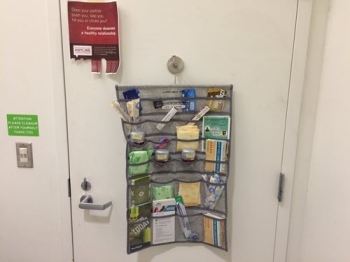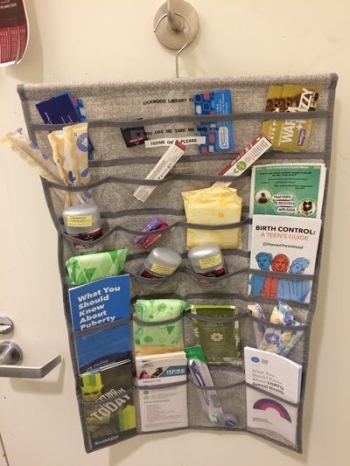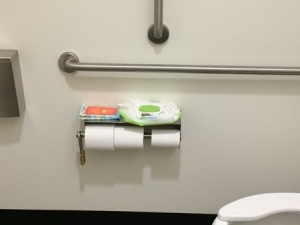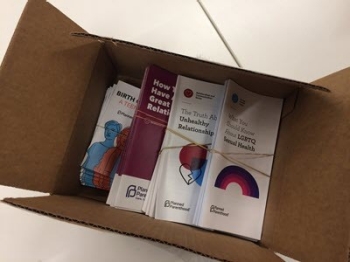Not Just Deodorant: Teen Hygiene Health Center at the Rockwood Makerspace

Judith Guzman-Montes, Bilingual Makerspace Library Assistant, at the Multnomah County Library in Portland, Oregon, created a Teen Hygiene Health Center in the restroom of the Rockwood makerspace to serve the needs of teens visiting the library. Judith shares how they are using a simple shoe or pocket organizer in the restroom to provide health and hygiene items, and provide pamphlets with information on related services.
Imagine being a teen again. Your body is changing and growing. There are less-than-pleasant smells and they are coming from you. Now imagine that your housing situation is not stable. You might be house-less or not have access to a sink to clean up. Hygiene items might not be a priority for you or your family right now. At the Rockwood makerspace, we noticed our teens experiencing these issues. We saw bullying happen during our gaming club because a teen’s feet smelled and he had no access to a shower. Another young person approached me for help when they first began their period and they did not have pads or tampons at home. In theory, the makerspace is about working with teens and emerging technologies but knowing that our teens had these needs, we began thinking of ways in which we could help our young people have access to vital hygiene items, to be independent in accessing them, and to have agency in what they need and what they choose.
We wanted folks to be able to access the supplies anonymously and on their own (asking a grown-up can be really embarrassing) in a safe place. The makerspace has a bathroom of its own and so this was a great place to locate our health center. The initial idea involved a small chest of drawers on wheels that we would place on a corner of the bathroom. However, it was going to be obtrusive, as our bathroom needs to be ADA compliant, allowing a wheelchair or other mobility device to have full motion. Our next best idea was to place items in a shoe holder behind the bathroom door. This way the supplies are easily browsable, advertise themselves, are not in the way and do not impede folks’ mobility.

Some of the items we have offered include:
- Toothbrushes, toothpaste, and small floss containers
- Pads and tampons
- Deodorant
- Soap
- Travel-size shampoo and conditioner bottles
- Lipstick and chapstick
- Sparkly body glitter
- Lotion
- Floss picks
- Individual wet wipe packs
- Small hand-sanitizer bottles
- Planned Parenthood handouts (birth control, puberty, LGBTQ sexual health)
- Mental Health resources (Youth Talkline cards and fliers)
- Handouts for information about Student Health Centers at local schools where students can access a nurse or physician for care
Deodorant, pads and tampons are our items of greatest use. Adult staff members have shared with me that they have accessed the health center when their own menstrual cycles caught them unprepared.
We also keep a wet wipes pack (similar to the ones parents and caregivers use for cleaning babies’ bottoms) next to the toilet for folks to use. When you have not been able to access a shower, these can be used to quickly wipe armpits, genital area, and feet to freshen up.

At a different library, I ran a fundraising campaign for basic hygiene supplies for our newly-arrived refugee and immigrant neighbors. I wanted to try the same model at the Rockwood makerspace so I petitioned staff at the library and at the district level for donations. Folks were very receptive to this need and many donated items. A challenge that a coworker pointed out is the sustainability of the project based on staff donations. Currently, my makerspace coworkers and I supply the majority of supplies for the health center.
After we hosted a visitor for Lines for Life, a regional non-profit dedicated to preventing substance abuse and suicide, we received donations of handouts regarding mental health aid (Advice Line, Youth Talkline).

Photo provided by Everett Public Library.
And our Teen Librarian has sourced Planned Parenthood handouts regarding birth control access, puberty, and just recently, we received handouts about LGBTQ sexual health and how to have healthy relationships. When my mom learned about the teen hygiene health center she put me in contact with a good friend of hers who works at Pacifica, a local cosmetics company in Portland. I receive donations of items that they cannot sell, have off-center labels, or are seasonal. You can see Pacifica lipsticks and deodorant wipes in the pictures above.
There have been some thorns as we've grown our health center. We have seen it “vandalized” a few times. Teens are curious and they will open up tampons or pads to see what’s inside or squeeze toothpaste tubes for the tactile sensation. We dispose of these supplies and, although I am sad to see the waste, I like to see it as an exploration of things they don’t know about. Sometimes, the teen health center is “raided” and all the supplies are gone. A young person is probably stocking up and/or possibly sourcing items for their friends and family members. Although the bathroom is in the makerspace, during open hours adults also have access to the supplies and I have seen them make use of them. We limit our health center to teens but if adults access it, I see it as reaching another population experiencing a need. On the subject of adults, we have staff/patrons who are very sensitive to smells. Teens just love flashy scents. When thinking of what’s appealing to youth, I have purchased Axe body spray for them and regretted it later.
The future of the Rockwood Teen Hygiene Health Center depends on making it more sustainable and less dependent on a group of staff members to run it. I am working on a collaboration with the Multnomah County Health department for a more steady supply of health supplies. We have a neighbor just behind us called SnowCap that supplies food and hygiene items to folks. I would like to have a collaboration with them as well. I have not researched this but I’ve been thinking of grants for funding our health center more sustainably or wrapping it up within our funding from the Library Foundation. We know that the need is there and we don’t want to discontinue helping our teens feel comfortable in their bodies.
